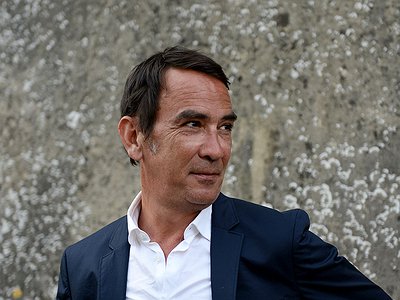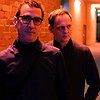Name: Anne-James Chaton
Nationality: French
Occupation: Sound Poet / Writer
Current Release: Alva Noto & Anne-James Chaton Alphabet on Noton
Shows: 17.11 1ST LUKE'S CHURCH AT BARBICAN, LONDON
/ 29.11 CAIXA FORUM, BARCELONA
Recommendations: Testimony: The United-States 1885-1890 by Charles Reznikoff /The works by the Japanese artist On Kawara.
Website/Contact: Anne-James has a website where you can explore his work and events www.annejameschaton.org
When did you start writing- and what or who were your early passions and influences? What is about literature and writing that drew you to it?
I began to write late compared to the usual idea of the poet - the fiery or tortured young man who inks pages from an early age. When I published my first texts I was 26 years old. I was influenced by Avant-garde poetry: the futurists, the DADA, the surrealists, the letterists, and sound poets. I am unable to recall the reason why I started writing but I have been always a passionate reader.
For most artists, originality is first preceded by a phase of learning and, often, emulating others. What was this like for you? How would you describe your own development as an artist and the transition towards your own voice? What is the relationship between copying, learning and your own creativity?
Imitation plays a big role in my writing and reflects the desire to repeat great gestures. A good part of the creative process involves the accumulation of attempts, trials and errors, often resulting in a new expressive model, far from the original idea. It’s like saving errors from one text to another - a singular voice emerges, which then leads me to the core idea of a new piece.
What were your main writing challenges in the beginning and how have they changed over time?
My first big challenge was to become invisible in the writing. With this I mean to erase the author from the textual narrative, ending up with a writing whose subject was not an expression of the self. The attempt in dissolving the author’s subjectivity in his/her own writing crossed my entire generation in the 90s.
I wanted to develop a work centred around what I call the "poor writings”, referring to text that our contemporary society published through automatic machines. This "objectivist" impulse has blunted over time and, in retrospect, I realize that forms of "I" still exist. I had to take into account this remanence of the subject which led me to new territories such as the narrative and the novel. It took me twenty years to reuse the "I" in literature.
Some have referred to writing novels as a means of survival, others as a form of deliberate dreaming. What is it to you? What is expressed through literature and poetry that cannot be expressed through other forms of art?
I always felt far from the literary world. Literature is something very concrete for me: I see writing as the physical part of the creative process and the grapheme as an imposed framework by the literature community. Textual forms of communication and writings are everywhere and available to us all the time. They belong to everyone, they circulate across communities and in all hands - especially with texts created my machines - like cash receipts. I don’t think poetry can expresses something new compared to other arts but it’s definitely a powerful medium to convey a message: it’s immediate, it’s visual and there is a musical component tied in.
How do you see the relationship between style, form, plot and storytelling – and how would you rate their importance for you, respectively?
It’s a difficult question because my writing questions these notions as well as the relationships they can maintain. Most of the time I want to make them work against each other and see what comes out from their collision.
How do you make use of technology? In terms of the feedback mechanism between technology and creativity, what do humans excel at, what do machines excel at?
The machines interest me in the way they generate accidents - of course humans do this too. I see the excellence of both when it emanates an irregularity. One piece illustrates this process to my mind: "It's Gone Rain" by the composer Steve Reich.
Could you take us through a day in your life, from a possible morning routine through to your work? Do you have a fixed schedule? How do writing and other aspects of your life feed back into each other - do you separate them or instead try to make them blend seamlessly?
When I'm not traveling, my days all have the same pace. I wake up around 8am. I read the newspaper and then I work until 11am. From 11- 12:30 I continue my work in a café in my neighbourhood. I might read too and go back home for lunch.
The afternoon is dedicated to the organization of work, emails and appointments. I go back to work around 6pm to more visual projects. I never work over night.



